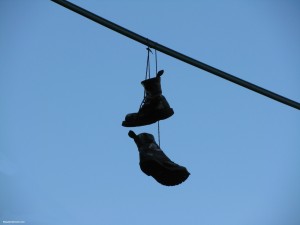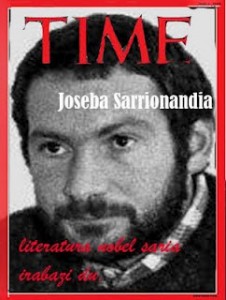Încălţări găurite
Joseba Sarrionandia (b.1958)
Drumul poate fi metafora vieţii,
Iar moartea doar nişte incălţări găurite, tânjind sub oglinda lunii,
Care luceşte subtil, pentru propria ei satisfacţie.
După o viată întreagă de umblat, pingelele
Nu-şi mai amintesc pe ce caldarâm au păşit:
O grămadă de pantofi găuriţi, cu şireturile pierdute
Pentru că drumeţii le-au luat pe toate
Ca să le spânzure de grindă.
Versiune în limba Română
de Constantin ROMAN
Londra, August 2012
© Copyright 2012, Constantin Roman
TRANSLATOR’s CAVEATS:
Joseba Sarrionandia is a man of many facets and therefore, unsurprisingly, a figure who means different things to different people. In some media quarters, in Spain, he is branded as a Basque terrorist, to the Spanish Ministry of Justice, he is a fugitive, who jumped the prison wall, in 1985, and has not been seen ever since. By contrast, to Basque nationalists he is a hero, whilst to Humanists, unconcerned with Politics, he is a writer, poet and translator of Coleridge, T.S, Eliot, Manuel Bandeira and Fernando Pessoa. This is a rather singular, if intriguing, combination of feats, which confounds the critics, challenges the authorities and, at the same time, puzzles those bystanders, who depict the world in black and white. In spite of his physical eclipse, trying to elude the hand of Spanish Justice, this reinvented Scarlet Pimpernel basks (no pun intended) in being the object of much debate, in the rarefied spheres of Academia, unconcerned about the rights or wrongs of Justice, whether he may be classified as a “Post-Modernist”, or even, at all, as a translator… As Sarrionandia has the propensity of ignoring the straitjacket of literary translation tenets and would rather offer HIS version of a reinvented Elliot or Coleridge, all turned into different personae, for the benefit of a Basque public. Clearly, this may not be sufficient in absolving Sarrionandia from the wrath of Justice in Spain, but then, history is full of such examples, where former terrorists survived to tell a story, some of them even becoming Heads of State, or high-profile politicians.
Given the above considerations, all this translator is attempting to highlight is the convergence between the lyrical expression (and poetical license) of a Basque writer (and former political prisoner too) on one hand, and on the other that of his many fellow poets, who perished under torture, in the Communist jails, for the only sin of having expressed different truths to the accepted mantra.





What a wonderful introduction you wrote to this man, unknown to me, and poet. Grazie. (Please translate.)
Thank you, my friend: I greatly appreciate your response.
Thank you my friend: I greatly appreciate your comment.